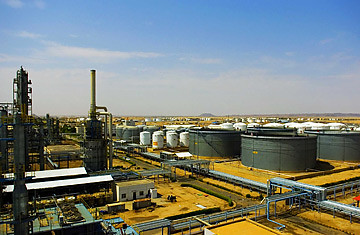
Sudan oil refinery where the newly-emerging oil-rich central African state has been under fire from U.S. imperialism for years. The leadership of the country is being hounded by the ICC which it is not a party to the Rome Statute., a photo by Pan-African News Wire File Photos on Flickr.
Sudan split to cut Khartoum's income by over 1/3
Wed Jun 15, 2011 10:15am GMT
No final oil agreement yet between north and south
Three-year plan includes cutting government spending
KHARTOUM, June 15 (Reuters) - Sudan's national revenues will fall by more than a third after losing the south's oil output when the country splits, pushing the north to cut state spending and find other sources of income, the finance minister said.
South Sudan is scheduled to secede on July 9. The two sides are still working on a series of sensitive issues including the exact position of the common border and how to manage the oil industry after the split.
While most of Sudan's oil fields are in southern territory, its pipelines and refineries are in the north, meaning the two will need to cooperate to keep crude flowing. They have not yet agreed how much the south should pay to use the infrastructure.
"As a result of the south's separation after July 9 and the exit of the south's petroleum returns from Sudan's budget, the national budget will lose 36.5 percent of its revenues," Finance Minister Ali Mahmoud told reporters late on Tuesday.
He said 73 percent of the country's oil came from the south and 27 percent originated in the north. The disputed Abyei region represented just 1 percent of Sudan's oil, he added.
Khartoum's state spending is expected to fall after the split as it has less of the country to fund. However, this is likely to be modest compared with the drop in income, as the south has provided a disproportionately large amount of state revenue due to its oil reserves.
The north, facing high inflation and a weakening currency, has prepared a three-year economic programme to try to ease the effects of the split.
"To address the economic effects of the separation, the three-year economic programme is focusing on remedying the situation by lowering government spending and increasing revenues," Mahmoud said.
Southerners voted to secede in a January plebiscite, the climax of a 2005 peace deal that ended decades of north-south civil war. That conflict, waged for all but a few years since 1955, killed an estimated 2 million people.
(Reporting by Khaled Abdelaziz and Alex Dziadosz; editing by David Stamp)
No comments:
Post a Comment